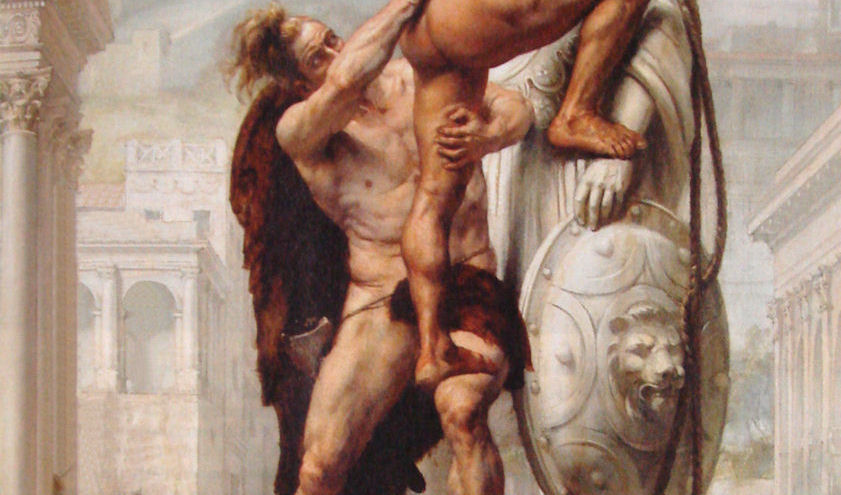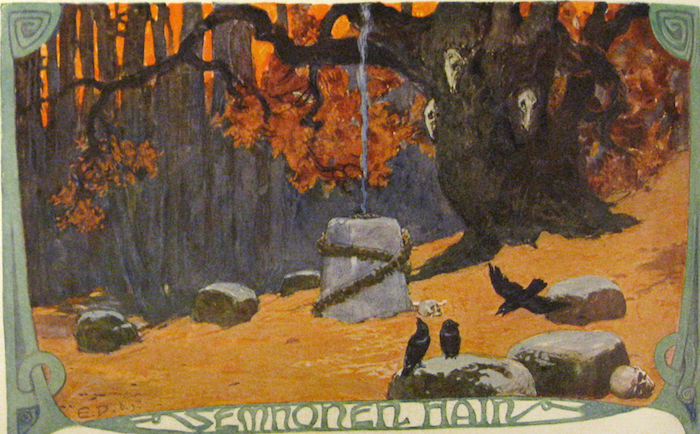There’s been kind of a thing in the RPG blogosphere of recasting standard fantasy monster races. Two that have stuck with me are Hayami Rasenjin’s hobgoblin and Monsters and Manuals’ Lamarckian orc. This is my version.
The Roman historian Tacitus gives us another version of the orc in his portrayal of Germanic barbarians: a bunch of naked, fractious egalitarians interested only in war. They’re great for the gaming table! Not only are they aesthetically distinct – naked redheads screaming into their shields – they also have a bunch of unique plot hooks baked right into their description. Let’s take a look!

Tacitus’ Germans are a frozen, blood-loving people. They have fierce-looking blue eyes, red hair, big frames, and strong limbs. Because they cannot abide manual labor, the only great endeavors they can undertake are violent. Their nobles are especially warlike, always looking for excuses to win or retain prestige in combat. They disdain precious metals, but raid constantly for land and livestock. As a people of the frozen north (relative to Tacitus’ Italy), they don’t notice cold or hunger, but are brought low by heat and thirst.
The Germanic barbarians divide their dark forests into dozens of tiny nations. Each is ruled by a king (born to his station) or a chief (chosen for his valor). Nonetheless, they’re oddly egalitarian. They hold regular assemblies where men of status can offer proposals, and the gathered tribe can shout down the speaker or show their approval by clashing their spears. The nations of Germany are constantly feuding, raiding, and counter-raiding. Tacitus considers this fortunate. German disunity is Rome’s best defense against the barbarians. The armed Germanic migrations into Roman territory 300 years later lend support to his argument. This is perfect for the table, because these are orcs you can defeat politically. With the orc lands broken into dozens of little feuding nations, you can manipulate a rival orcish king into attacking the nation that’s giving you trouble.
The barbarians have a great love of drink and of dice games. When they run out of goods to gamble on the throw of the dice, they’ll even bet their own freedom. The loser becomes the winner’s slave. PCs who don’t mind rigging a dice game (and think they can get away with it) can surely manipulate German-style orcs with crooked dice.
Tacitus is particularly impressed by Germanic valor in battle. The barbarians don’t have much iron, so they fight with spear, shield, and javelin, both mounted and afoot. Most fight naked. To egg themselves on to greater ferocity, Germanic warriors bring their families and holy artifacts with them to war. Being able to see what will be destroyed if they lose increases their determination. Though savage, they fight smart. When losing or outnumbered, they retreat in a careful, organized way. Their trademark, though, is a special chant called the baritus. Fighters hold their shields in front of their mouths and roar harshly and intermittently. The sound reverberates off their shields, mingling everyone’s chaotic shouting. With this display, they intend to terrify their enemies and fortify themselves.
Finally, Tacitus’ description of the Haari tribe of modern-day Poland deserves a special mention. They paint their shields black and dye their bodies the same. They fight their battles on pitch-dark nights so their enemies don’t see them coming – until the ghoulish horde is upon them!

The Germans do not maintain buildings as shrines. Their holy places are woods and groves. Here, they honor their highest god with human sacrifice. They also practice prophecy. The Germans keep in these groves pure white horses untainted by saddle or labor. The priest and king or chief yoke them to a sacred chariot and walk beside them, interpreting their neighs and snorts as augury. Another, bloodier, form of prophecy requires kidnapping a victim from a nation with which they are at war. The priests give the captive the traditional weapon of his people and make him fight a champion of the priests’ nation. The victor in the fight will be the victor in the war. This is a fun plot hook. Either the PCs have to rescue a kidnapee from your Germanic-style orcs, or they themselves are kidnapped and made to fight.
One particularly noteworthy grove is on an island in the storm-tossed sea near the mouth of the Elbe River. It contains the cloth-draped chariot of the fertility goddess Nerthus. She comes to her people to ride in her chariot, pulled by cows, and where she goes, there’s peace and merrymaking for a few days. When she returns to the domain of the gods, she, her chariot, and her vestments are washed by slaves in a secret lake. The Germans then drown the slaves in the same lake. Again, rescuing the slaves is a great plot hook. If the slaves aren’t there to wash her, Nerthus can’t return home, and the Germans must remain at peace.
–
Finally, note that while all this is fun for the table, you can’t treat it as strict historical fact. You have to treat any ancient author writing about a far-off people with a grain of salt. Tacitus is no exception. For example, he says the Germans disdain gold and silver, but we’ve found plenty of both in German archaeological digs.






